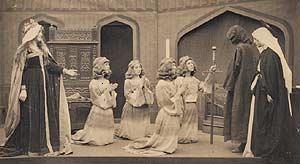
"Everyman" was a play directed by William Poel to portray the medieval mystery plays back in the Elizabethan times. Shakespeare was the original creator of this work.
|

|
Medieval drama, including miracle and mystery plays, originated from religion, specifically from Church and the Bible. The first French drama offered by the twelfth century is called "Adam", and was written by an Anglo-Norman author whose name is unknown (New Advent Plays, Plays and Miracles of the Twelfth and Thirteenth Centuries) The subject extends from the Fall in the terrestrial Paradise to the time of the Prophets who foretell the Redeemer, relating to several books in the Bible. Many of the medieval dramas created had names to separate them from other earlier dramas. The fifteenth century was known as the century of “mysteries.” As an example of this naming system, Spain named its dramas “autos,” and Italy named them funzione [fun-zee-oo-n]. The mystery plays can also be known as cycles of plays in English verse dramatizing key Biblical stories from the Creation of the Universe and the Last Judgment. The cycles were usually performed in connection with the new early summer feast of Corpus Christi, which was instituted in 1311. Other connections include Thursday after Trinity Sunday in June and possibly day in honor of the Eucharist [uu-kar-ist]. The cycle plays represent an intriguing balance between the religious and the secular. Performed outdoors in English, on holidays these Biblical plays are full of humor and energy. (Medieval Imaginations, paragraph 4). Mystery plays were performed at religious or church festivals and were most common in the 14th and 15th centuries. But in the 16th century Henry the Eighth banned all drama that could be used to celebrate the Catholic doctrine. In medieval times, mystery cycles formed the centerpiece of popular day-long festivals enjoyed by hundreds of people. The mystery plays themselves were performed by local craftsman’s guilds that would compete with each other to produce the best play (What are Mystery Plays, paragraph 2). The Lichfield Mystery Plays present medieval mystery plays as they were originally conceived, with three performances of each play taking place on separate stages in the Market Place, Stowe Fields and finally in the Cathedral (What are Mystery Plays, paragraph 3). These were popular places to see a play and were, therefore, more inclined to gather viewers. Most early theatre in England was religious and evolved from the liturgical drama. These originated in the tenth and eleventh centuries. As lessons to teach people about the Bible and its stories, mystery and miracle plays became popular. Most of these drama plays were written in Latin even though most people had improper education and could not understand such language. Therefore, most people were unable to read or understand Latin Church mass. Miracle plays told the stories of the lives of different saints. At this time people believed in the power of the saints to solve their problems. Holy relics supposedly taken from the bodies of the saints were kept by the church. People paid money to the church to pray to these relics. Many believed these relics could cure illnesses (Drama Guide Tour, paragraph 4). Due to the suspense and drama that were acted in the mystery and miracle plays, these works were very addicting and were often viewed by villagers. These plays were sometimes even viewed by Queen Elizabeth the first. This meant the play was quite entertaining. So due to the success of these works, the medieval mystery and miracle plays were acted throughout the fourteenth and fifteenth centuries. Question #1: What is the origin of the medieval drama? Question #2: What was the first French drama offered by the twelfth century called? Question #3: The fifteenth century is known as the century of what? Question #4: What key Biblical stories helped originate these dramas? Question #5: Mystery plays were usually performed in connection with what? Question #6: The cycle plays represent an intriguing balance between what? Question #7: In what centuries were mystery plays most common? Question #8: The plays were performed by what people that would compete with each other to produce the best play? Question #9: What three places were the Lichfield Mystery Plays performed on-stage? Question #10: Most early theatre in England was religious and evolved from what? Question #11: What kind of plays were produced by local towns and were written in cycles? Question #12: What plays told the stories of the lives of different saints? |
Links: |